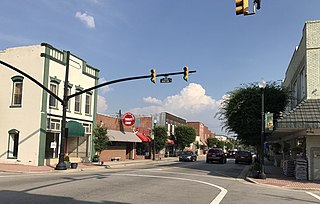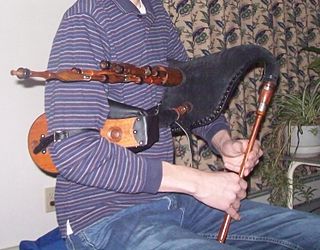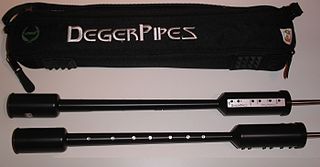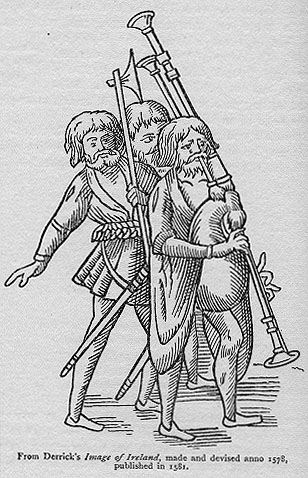
Bagpipes are a woodwind instrument using enclosed reeds fed from a constant reservoir of air in the form of a bag. The Great Highland bagpipes are well known, but people have played bagpipes for centuries throughout large parts of Europe, Northern Africa, Western Asia, around the Persian Gulf and northern parts of South Asia.

Zebulon is the easternmost town in Wake County, North Carolina, United States. The population was 6,903 at the 2020 census. Zebulon is part of the Research Triangle metropolitan region. In May 2022, Zebulon was ranked North Carolina's second fastest growing town, only behind neighboring Wendell.

The great Highland bagpipe is a type of bagpipe native to Scotland, and the Scottish analogue to the great Irish warpipes. It has acquired widespread recognition through its usage in the British military and in pipe bands throughout the world.

The Scottish smallpipe is a bellows-blown bagpipe re-developed by Colin Ross and many others, adapted from an earlier design of the instrument. There are surviving bellows-blown examples of similar historical instruments as well as the mouth-blown Montgomery smallpipes, dated 1757, which are held in the National Museum of Scotland. Some instruments are being built as direct copies of historical examples, but few modern instruments are directly modelled on older examples; the modern instrument is typically larger and lower-pitched. The innovations leading to the modern instrument, in particular the design of the reeds, were largely taken from the Northumbrian smallpipes.

The border pipes are a type of bagpipe related to the Scottish Great Highland Bagpipe. It is perhaps confusable with the Scottish smallpipe, although it is a quite different and much older instrument. Although most modern Border pipes are closely modelled on similar historic instruments, the modern Scottish smallpipes are a modern reinvention, inspired by historic instruments but largely based on Northumbrian smallpipes in their construction.

Battlefield Band is a Scottish traditional music group. Founded in Glasgow in 1969, they have released over 30 albums and undergone many changes of lineup. As of 2010, none of the original founders remain in the band.
The Army School of Bagpipe Music and Highland Drumming is a British Army training establishment that provides instruction on Scottish pipe band music to military pipers and drummers.

Glasgow Police Pipe Band was a grade one pipe band from Glasgow, Scotland. Founded in 1883 as the Burgh of Govan Police Pipe Band, the band enjoyed its greatest competitive success as the Strathclyde Police Pipe Band. It ceased competing as Glasgow Police Pipe Band in 2021.
Rufus Harley Jr. was an American jazz musician known primarily as the first jazz musician to adopt the Great Highland bagpipe as his primary instrument.

Jori Lance Chisholm is an American professional bagpipe player and teacher who lives in Seattle, Washington. Chisholm is a successful solo competitor winning the United States Gold Medal four times and has placed in the top three in Scotland's Argyllshire Gathering Gold Medal competition. He played with the six-time Grade One World Champion Simon Fraser University Pipe Band and was a featured solo performer for the band on multiple occasions. Chisholm has performed in front of sold-out audiences with The Chieftains and with ex-Grateful Dead rocker Bob Weir and his band Ratdog, and has been featured as a soloist or band member on over 20 recordings. His debut solo album Bagpipe Revolution was nominated for Album of the Year by Pipes|Drums magazine. He writes the "Sound Technique" column for the National Piping Centre’s bi-monthly Piping Today Magazine. The New York Times featured Chisholm's online teaching program, BagpipeLessons.com, and described him as a "top-tier teacher" in a front-page story about the growth of Skype music lessons. A cover story in American Profile Magazine named Chisholm one of the "world's elite pipers."

Eric Rigler is an American player of the Uilleann pipes, Great Highland Bagpipes, and tin whistle. He performs as a solo artist and with the band Bad Haggis, and has been featured on a number of movie soundtracks. He has been described as "the most recorded bagpiper of all time". He has been playing all forms of bagpipes and tin whistles since he was a child, performing solo, with bagpipe bands and other musical groups.

Welsh bagpipes are a related instrument to one type of bagpipe, a chanter, which when played without the bag and drone is called a pibgorn. The generic term pibau which covers all woodwind instruments is also used in Welsh. They have been played, documented, represented and described in Wales since the fourteenth century. A piper in Welsh is called a pibydd or a pibgodwr.

The electronic bagpipes is an electronic musical instrument emulating the tone and/or playing style of the bagpipes. Most electronic bagpipe emulators feature a simulated chanter, which is used to play the melody. Some models also produce a harmonizing drone(s). Some variants employ a simulated bag, wherein the player's pressure on the bag activates a switch maintaining a constant tone. As with other electronic musical instruments, they must be plugged into an instrument amplifier and loudspeaker to hear the sound. Some electronic bagpipes are MIDI controllers that can be plugged into a synth module to create synthesized or sampled bagpipe sounds.
Roderick 'Roddy' (R.S.) MacDonald is a pipe major, living in Brisbane, Australia, and a composer of tunes for the bagpipes.
Hugh Robertson (1730–1822) was a Scottish wood and ivory turner and a master crafter of woodwind instruments such as pastoral pipes, union pipes, and great Highland bagpipes.

Irish warpipes are an Irish analogue of the Scottish great Highland bagpipe. "Warpipes" is originally an English term. The first use of the Gaelic term in Ireland was recorded in a poem by Seán Ó Neachtain, in which the bagpipes are referred to as píb mhór.
Willie McCallum is Scottish Highland bagpipe player.
Donald MacPherson was a Scottish bagpipe player, and one of the most successful competitive solo pipers of all time.












